
A shared approach to problem solving and a willingness to tussle over tough questions unites CEOs and CFOs who lead together.
- By
- October 10, 2015
- Leadership

When an organization’s CEO and CFO both hail from Booth, there’s a common methodology to problem solving that cuts to the chase. In a fast-moving environment, according to Byron David Trott, AB ’81, MBA,’82, founder, chairman, and CEO of BDT & Company, applying “the same disciplined approach” as his Booth-trained CFO Mike Burns, ’03, speeds decision making and removes unnecessary drama from the equation.
This doesn’t mean that they always agree—far from it. Maria Kim, ’12 (XP-81), CEO of Chicago-based the Cara Program, describes her CFO Carla Denison-Bickett, ’04, as “a healthy agitator.” But in many ways, the open debate leads to increased dynamism that infects the entire leadership team.
At BDT & Company in Chicago and Oaktree Capital Management in Los Angeles, the CFOs were the first and most significant external hires by the founding CEOs—and the pairs are still together. At Oaktree, it’s been 20 years as a team for CEO Howard Marks, ’69, and David Kirchheimer, ’78. Kim and Denison-Bickett have led nonprofit the Cara Program for the past year, but previously worked at the organization together with longtime CEO Eric Weinheimer, ’94, before he moved on.
“I know what you’re made of if you graduated from the University of Chicago,” said Trott, who’s also a member of the University of Chicago Board of Trustees. “I know that you’ve learned to think and refine. It gives me a confidence level in hiring you.”
It’s not easy to find BDT & Company. The merchant bank that Trott founded in 2009 has no publicly accessible website, and its employees seldom give interviews. The families and founders who own many of the world’s largest companies know where to look, however. Trott and his team have advised on and invested in deals involving many of the world’s wealthiest families, including the Pritzkers, Wrigleys, Waltons, and perhaps most famously Warren Buffett—a relationship that dates to the early 2000s.
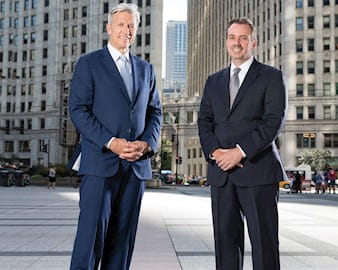
As CFO, Burns has financial, tax, and regulatory responsibilities for the firm and its funds. Since its founding, BDT Capital Partners has raised $8 billion in investment capital and invested in more than a dozen family and founder-led businesses, and its affiliated advisory business has built a roster of closely held advisory clients.
Trott and Burns share an enthusiasm for digging deeper for information and solutions that lead to the insights for which BDT is known—Burns attributes that to “our Booth training.” Trott “solicits input from others and encourages people to challenge him, as do I,” Burns said. “We like people who think differently.”
Burns was one of the few hires from outside Trott’s relationships when BDT was founded; he was then at UBS, and was located through an executive search. His diverse career that encompasses disciplines as varied as accounting and deprivatives made him a strong fit, and, Trott added, his Booth degree didn’t hurt. BDT hires from around the world, but close to 20 percent of its investment professionals have a University of Chicago degree.
“Many of our core principles also are promoted at Booth,” Burns said, “quality execution, rigorous analysis, integrity, seeking win-win solutions, and working collectively as a team to find the best answers.
“Everyone at the firm engages in in-depth analysis and debate that leads us to the best decisions,” he said. “As stewards of our limited partners’ capital, we focus on assessing opportunities and making quick decisions on things that don’t fit our investment objectives and philosophy.”
The relationship between the CEO and the CFO is “fairly seamless,” according to Trott. “Mike and his team provide exacting analysis and reporting, but recognize that I will come back at them seeking additional information or a new way of looking at something. We share an appreciation for identifying unique solutions to complex issues.”
BDT may keep a discreet profile, but Trott is not shy about putting Chicago on the map where global advice and capital are concerned. BDT’s network of family and founder-led business owners is expanding globally. Trott also is committed to expanding opportunities for others, including through scholarships. He founded the Metcalf Internship Program, which since its inception in 1997 has placed more than 4,500 students in summer internships. “When you travel the world and you say you went to the University of Chicago,” Trott said, “they know you come to the table with rigor and curiosity but also a bit of grit.”
Every quarter, Kim and Denison-Bickett have a mini-retreat at one of their homes. Denison-Bickett calls herself Spock to Kim’s Kirk. In these daylong sessions, the pair refine strategies and use this out-of-office time to map out short- and long-term priorities. Chicago-based Cara is a $6.8 million social enterprise organization that finds jobs for the unemployed.
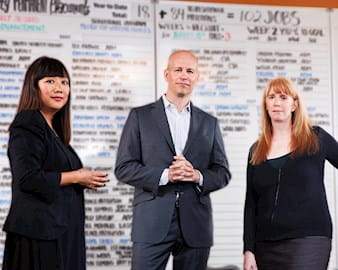
“When you run a social purpose enterprise, you’re soaking in a large social problem that can be overwhelming,” Kim said. “But we break our day-to-day challenges into component parts and figure out solutions.”
The executives said they attended Booth because they wanted to study the particular challenges of managing, leading, and growing a business—any business, regardless of legal designation. “I went to Booth because it’s hard,” Kim said. Booth taught her to apply data-driven decision making and an understanding of organizational behavior to an intractable social problem, which she calls “pretty sexy stuff.”
Kim and Denison-Bickett were hired by Weinheimer, who served as president and CEO from 1996 to 2014. (He’s now in the same role at the Chicago-based Donors Forum). Kim joined the nonprofit in 2005 as director of development and rose through the organization to succeed Weinheimer as CEO last year. Denison-Bickett joined Cara in 2009 as director of finance and became CFO in 2011.
Weinheimer said that the Booth background he shared with Denison-Bickett helped in his choice to hire her—and they both encouraged Kim to enroll in the Executive MBA Program. For Weinheimer, it was important that the strategic-thinking skills and devotion to analysis he brought from Booth continued at Cara. “You make sure you hire people who are willing to devote their energies to this type of work—believe me, they could make a heck of a lot more money someplace else.
“We break our day-to-day challenges into components and figure out solutions.”
“To build a sustainable business is difficult anywhere,” he added. “But when you’re also serving those who are most in need, it’s complicated. For the long-term success of the organization, you have to extricate the people part of the equation in order to be logical and analytical. If you’re about building a model that is replicable, you need to be very focused on business-type decisions. Otherwise you won’t be around to do the work."
Building a replicable model at Cara goes beyond mimicking the traditional nonprofit business plan of donations, grants, and fund-raising, Kim and Denison-Bickett agree. Cara launches and operates for-profit businesses that help support its work. “I don’t like the term nonprofit,” Kim said, “because it defines you by what you are not. We are a social purpose enterprise. I want people to see this as an investment like any other investment with a quantifiable return."
Kim and Denison-Bickett worked in financial services before Weinheimer brought them on, and the pair continually assesses the organization’s social return on investment: “For the individuals we place, what are they contributing to society in income taxes, Social Security, and other purchasing,” Kim said. “Plus what are they not costing society if we’re keeping them off purchasing goods with food stamps and out of using the emergency room for primary health care? We look at that over a five-year horizon. Data permeates everything we do. It’s in our DNA.”
When Marks and six other former colleagues from investment management company TCW Group founded Oaktree Capital Management 20 years ago, they were quickly successful in landing clients. More than 30 TCW clients transferred $1.5 billion to Los Angeles–based Oaktree within three months of its founding as a specialist in alternative investments such as distressed debt. Fortunately, the Oaktree founders were prepared for this quick start’s demands on both the investment and noninvestment sides of the business.
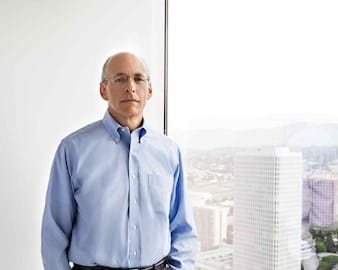
While planning Oaktree’s launch, Marks had met Kirchheimer, a former colleague of one of the founders. He was the first hire on the nonfinancial side of the business. With no financial services background, Kirchheimer, then chief administrative officer of Ticketmaster Corp. in Los Angeles, contacted three friends with long careers in finance and asked them what they thought about the start-up. “They all said the same thing,” Kirchheimer said. “‘If you don’t go to work for Howard Marks, you’re an idiot, and if you don’t take the job, give him my number.’” Kirchheimer joined Oaktree as chief financial and administrative officer.
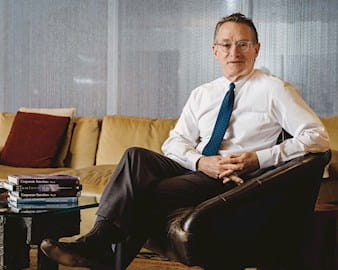
“Steady Eddie” is Marks’s affectionate name for Kirchheimer. “You can have the greatest investment organization in the world,” Marks said, “but if the clients don’t get their statements on time, they won’t be very happy.”
At Ticketmaster, Kirchheimer took “care of thousands of transactions a day,” Marks said. “If he could do that, he could certainly handle what we had to do.”
For his part, Kirchheimer had to build the nonfinancial side of Oaktree’s business from scratch in an unfamiliar industry. Kirchheimer credited this to his ability to juggle a range of responsibilities—from signing off on SEC filings to staffing the mailroom—as well as the fact that Marks didn’t nickel and dime him in his talent search. “Howard wants ‘A’ players at every position,” he said, “and he let me hire the best and outsource to the best.”
“I don’t claim that our record has been flawless,” Marks said, “but we didn’t have any significant stumbles.”
Both the investment and noninvestment sides of the business are rooted in exacting rigorous analysis. “When I went to Booth, the ‘new theory of finance and investment’ was just beginning to be taught,” Marks said. “I learned important concepts that others didn’t know, and people who went to other schools didn’t learn. That gave me a leg up.”
“I learned important concepts that others didn’t know, and people who went to other schools didn’t learn. That gave me a leg up.”
The same devotion to research drives Kirchheimer’s decision making. “One of my mantras is that the data informs,” he said. “Whether it’s hiring trends or financial results, data is just one way to be open-minded and objective. Booth gave us a shared respect for that disciplined approach.”
When in 2007 Oaktree saw a number of competitors going public, Marks and Kirchheimer weren’t sure if that would be the best path. They took a characteristically systematic approach to assessing options. They looked at the pros and cons, examined the uncertainties and assessed the risk, and ultimately decided to go quasi public by selling shares on a private exchange. With the intermediate solution, “We didn’t have all the visibility or reporting requirements that go with being public,” Kirchheimer said.
Five years later, having resolved many of the uncertainties, the company went public on the New York Stock Exchange. Today, the firm has more than 900 employees, offices in 17 cities, and more than $100 billion in assets under management.
When Daniel Oh, ’00, wrote the business plan for what is now Renewable Energy Group (REG) in 2005, he knew that eventually he would need a CFO with a background like that of Chad Stone, ’98. (Oh joined the company as CFO and became CEO in 2011). The company, today a producer of biofuels and renewable chemicals, was then part of a large agricultural cooperative and was about to be spun off.
Stone, with experience at PricewaterhouseCoopers and Arthur Andersen, signed on four years later, when the company was about to make acquisitions and prepare for an IPO. Oh didn’t limit his search to Booth alumni but, “there was something personally attractive for me to have someone from Booth,” he said. “Having similar expectations about business and how to think makes everything else easier.”
Oh needed that shared approach because time was of the essence. He had tried to take REG public in 2007, as the appetite for new offerings slowed down. Yet the economic downturn offered the chance for REG to acquire struggling companies at bargain prices. “Opportunities are fleeting,” Stone said.
In order to get to the best decision quickly, they look to each other “to poke holes in any potential opportunity,” Stone said. “It’s co-reliance. He expects me to question him and I am comfortable with him vigorously debating with me.”
Stone said that he and Oh frequently have disagreed about potential acquisitions and “walk away from many deals for every one we close.” As they work through the data and their analyses, they arrive at a shared decision. They may change the offer price, the scope of the deal, specific terms, Stone said, or just leave well enough alone. “Dollars are at stake,” Stone said. “Analyze, prioritize, and be selective—that’s what we’ve been concentrating on the last several years.”
Oh and Stone led the company’s IPO in January 2012 and continue to look for acquisitions. Yet this kind of growth comes with its own problems: nearly 80 percent of REG employees have joined in the past four years
To instill comfort with analytics and data-driven decisions, they often send employees to Booth Executive Education programs in Chicago, “which helps them get in touch with the Booth approach,” Oh said. “They become comfortable with the spirited debate necessary to drive major decisions quickly and efficiently.”
Despite the tech bubble having burst, Matt Ferguson, ’01, and Kevin Knapp, ’02, were still working for digital companies when they met in a strategy class in the Evening MBA Program. Ferguson was working on strategic partnerships at Headhunter.net, a CareerBuilder precursor, and Knapp had helped launch Cars.com.
The two collaborated on a class project about how classified ads were fleeing print newspapers for the digital space. When CareerBuilder hired Ferguson as COO in 2000, just before his graduation, he brought Knapp along as CFO. “We were finding a better way for people to do things,” said Ferguson, who became CEO in 2004. “Early on, we were transforming the industry.”
Macroeconomics—the study of job creation and economic growth—provides the underpinning for CareerBuilder’s model, Ferguson said. But the process of questioning, rigorous analysis, and use of data—learned at Booth—informs operational decisions on which they collaborate, from how much to spend on advertising to which new cities to launch in.
CareerBuilder began expanding globally in 2003 and operates job sites in more than two dozen countries and 60 markets. It subsequently began publishing quarterly employment forecasts, added comparative data on compensation, and created sites specific to the health-care and hospitality industries. The pair are working on the next big idea: development of software for the entire pre-hire process on a global basis.
With the shift to a software-as-a-service (SaaS) platform (licensing software on a subscription basis), Ferguson and Knapp agreed they had to ramp up marketing in order to broadcast the new strategy. When the opportunity arose to become the title sponsor of the former Bob Hope Classic golf tournament, they had to make a quick decision.
Knapp pulled together a cost-benefit analysis and accounting impact assessment to ensure it would be a good ROI and fit within the company’s financial performance goals. The company signed on to what is now the CareerBuilder Challenge.
“Our ability to know what the other needs in order to make good decisions enables us to spread out responsibilities,” Knapp said, “increasing our capacity to react faster to opportunities as they arise.”
Both leaders have applied lessons from software development to other parts of the company. “It’s natural that developers would have a big impact on the way the company works,” Knapp said. “We try to get everyone to ‘go see for yourself’ which is a lean software development technique,” he said. “Iterate quickly. Test. Repeat. Find waste, fix it, and move on quickly.”
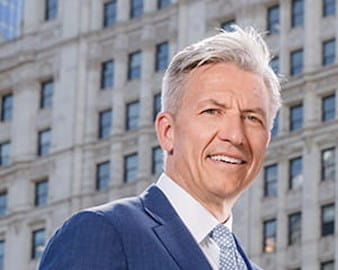
Merchant bank BDT advises some of America's wealthiest families and family-owned companies. Its investment arm, BDT Capital Partners, has raised $8 billion in investment funds and has provided capital to a roster of closely held companies.

The Chicago-based nonprofit fights homelessness and poverty by providing life and career skills, job placement, and follow-up. Since its founding in 1991, Cara has placed more than 5,000 people in long-term employment and boasts a one-year retention rate of 75 percent for workers who are placed in jobs.
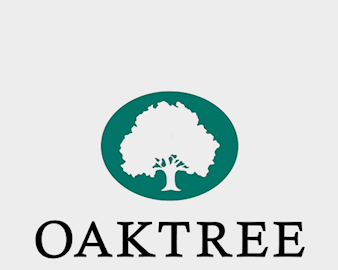
The Los Angeles-based firm, with more than $100 billion in assets under management, is a leader among global investment managers specializing in alternative investments, such as distressed debt, corporate debt, control investing and real estate.

REG is a leading North American advanced biofuels producer and developer of renewable chemicals, with 11 biorefineries across the US. REG's converts natural fats, oils, and greases into advanced biofuels and converts diverse feedstocks into renewable chemicals.
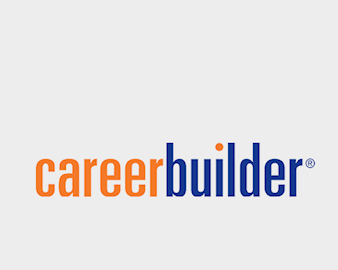
After the dot-com bubble burst, CareerBuilder brought in Matt Ferguson, '01, and Kevin Knapp, '02, to right the ship. Today the Chicago-based company is a global resource that connects job seekers and employers. CareerBuilder now serves 24 million website visitors a month in more than 20 countries with 2,800 employees.
When David Kirchheimer, ’78, CFO of Los Angeles–based Oaktree Capital Management, went to work for Howard Marks, ’69, there was one unanticipated benefit—he became more engaged at Booth. The school often asked Marks, Oaktree’s high-profile CEO, to speak to student and alumni groups. When Marks was out of town or otherwise unavailable, which happened frequently, event organizers turned to Kirchheimer. “The database showed that I’d graduated from there too, so they asked for me,” he said.
Many Booth alumni reconnect with the school when they find themselves working in a corporate environment with other graduates.
For the past seven years, Kirchheimer has served on the Council on Chicago Booth, the alumni group that advises Booth leadership. He and David Anderson, ’77, the retired CFO of Morristown, New Jersey–based Honeywell International, cofounded the CFO Forum in 2011, which brings together CFOs and faculty members to explore the critical issues facing top financial executives.
Mike Burns, ’03, CFO of BDT Capital Partners, also is active in the forum and particularly values the exchanges with faculty. “The professors probably learn as much from us as we do from them,” he said.
Eric Weinheimer, ’94, CEO of the Chicago-based Donors Forum and former CEO of the Cara Program, serves on the advisory board of the three-year-old Social Enterprise Initiative at Booth, which provides educational opportunities for students and alumni interested in the social sector. Students in SEI’s Social Enterprise Lab, in turn, have consulted for Cara, offering business ideas that could help the nonprofit in its mission of providing jobs for the unemployed. “SEI is helping us think about sustainable business modes that can stick,” said CEO Maria Kim, ’12 (XP-81). Kim spoke at SEI’s On Board conference on the topic of nonprofit board service earlier this year, and is scheduled to speak at the upcoming Booth Women Connect Conference.

Meet five Booth founders taking a local approach to addressing challenges such as climate change and food instability.
Sustainability Starts at Home
Inspiring people to protect wildlife together takes dedicated leadership—and Benjamin Tan, ’06, is rising to the challenge.
A Workweek Amid the Wildlife
Fifth-generation CEO Soichiro “Sean” Kurachi, ’85, reflects on the 150th anniversary of Japan Corn Starch Co.
Kernels of Wisdom